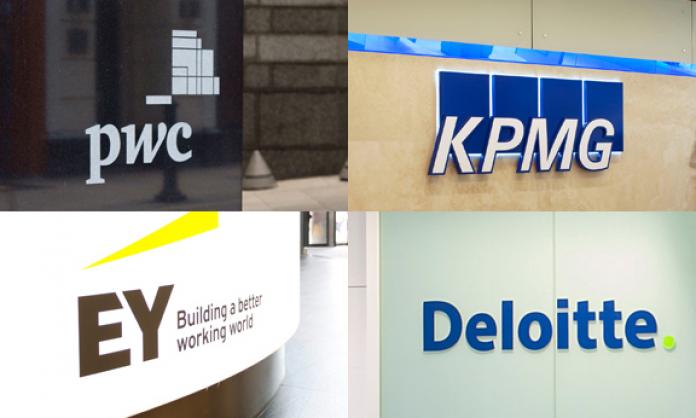The Big Four global accounting firms have banked $3.1 billion in taxpayer income in the past six years for government consulting. That’s three thousand one hundred million dollars in government revenue to just four firms – PwC, EY, KPMG and Deloitte – for providing advice.
The four firms are major political donors. Ironically, as the architects of global tax avoidance, the Big Four are more responsible than any other institutions for undermining the government’s tax base thanks to their tax avoidance advice for multinational clients. Yet they are also the biggest winners of taxpayer consultancies.
Analysis by data warehousing expert Greg Bean has filtered down the numbers to show a dramatic escalation in government outsourcing since the Abbott/Turnbull/Morrison government came to office.
The $3.1 billion represents around 7,300 government contracts. Meanwhile, Big Four revenues shot up by double digits in Australia again last year. Collectively, they posted total income of $7.8 billion thanks, in good measure to the government outsourcing bonanza.
Mind you, these figures relate only to federal government spending.
The states lavish the Big Four with hundreds of millions of dollars in consulting work too, although transparency over state spending is extremely poor so it is impossible to get a clear picture of how the states spend their tax.
The most alarming thing about these figures is the spike in 2015 when the value of taxpayer mandates shot up 52 percent – and when Tony Abbott was prime minister. Extrapolating the figures for this year based on mandates awarded to 16 September, the Big Four are on track to post another record at a projected $658 million in federal government income.
Despite their size and the critical role they play in government in this country, the Big Four are only required by regulators to disclose their annual revenue. Collectively, they reveal nothing more than that. Due to their secretive partnership structures they do not publish financial statements. Income tends to rise 10 percent a year.
Collectively they posted an $800 million increase in revenue in 2018.
PwC has overtaken KPMG in the past two years as winning the most money in government contracts. Over the six and a three quarter years analysed, KPMG picked up $995 million in government work versus $826 million for PwC, $647 million for EY and $634 million for Deloitte.
This blow-out in government spending is matched by a rise in procurement costs, particularly in defence.
They all reported their 2018 results in August, if they can be labelled “results” because there is only one number disclosed: revenue.
PwC posted a 10.8 percent increase in revenue to $2.35 billion.
“Our Australian Consulting business had an outstanding year with People & Org and Risk Consulting both delivering 27 percent revenue growth, Business & Performance Consulting achieving 17 percent revenue growth and Strategy& 19 percent revenue growth.”
EY Australia’s revenue rose 9.8 percent to $1.79 billion. KPMG Australia generated revenues of $1.64 billion, up by 9.2 percent on the previous year. The firm employed more than 7,000 people, with record intakes of both new partners and graduates.
Deloitte also posted another record year, its fourth year of 15 percent revenue growth. Revenue in Australia was $2 billion.
Besides advising the government on tax, while advising their clients on how to pay as little as possible tax, the Big Four are members of the Business Council of Australia which calls for cutting wages and lower taxes for large corporations.
Truly, this lot are the global elite of corporate welfare recipients.
----------
First published at www.michaelwest.com.au.








